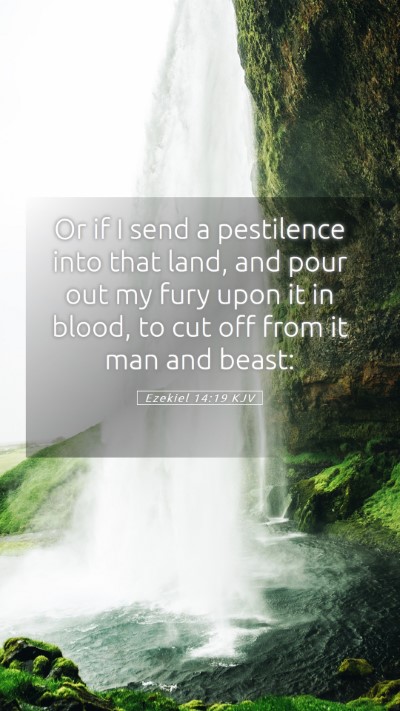Bible Verse Meaning of Ezekiel 14:19
Verse: Ezekiel 14:19 - "Or if I send a pestilence into that land, and pour out my fury upon it in blood, to cut off from it man and beast."
Understanding the Context: This verse is situated within a broader discourse where God is addressing the sinful behavior of His people through prophet Ezekiel. The chapter warns of impending judgment due to iniquities. God declares that even if the most righteous men, like Noah, Daniel, and Job, were in the land, they would only save themselves through their righteousness, not the community.
Insights from Public Domain Commentaries
-
Matthew Henry:
Henry emphasizes the serious nature of divine judgment. He interprets the pestilence mentioned as a direct action from God to purge the land of its wickedness. He notes that God’s wrath, expressed through such calamities, serves as both a warning and a means of correction for the people. The verse illustrates the extent to which God will go to address sin and to call His people back to righteousness.
-
Albert Barnes:
Barnes highlights the symbolic meaning of pestilence in this context. He views it as a representation of the spiritual decay pervasive among the Israelites. He explains that this divine threat illustrates God's sovereignty over life and death. The reference to both man and beast signifies that the judgment affects all living things, underscoring the serious impact of sin on the community and the land itself.
-
Adam Clarke:
Clarke focuses on the implications of divine judgment being unleashed. He notes that God’s anger is poured out in response to persistent unrighteousness, and pestilence was a common form of divine punishment in biblical history. Clarke adds that such afflictions are meant to get the attention of the people, urging them to reconsider their paths and turn back to God for mercy and forgiveness.
Key Themes in Ezekiel 14:19
This verse conveys several important themes relevant to modern Bible study:
- The Severity of Sin: It indicates the profound consequences of national sin against God.
- God's Sovereignty: The text emphasizes that God has the ultimate authority to enact judgment on His creation.
- Call to Righteousness: The righteous are reminded of the importance of maintaining their integrity and faith in the face of communal sin.
- Judgment and Mercy: The warning implicit in biblical judgments is a call to repentance and seeking God’s mercy.
Related Scripture References
- 2 Chronicles 7:13-14: Discusses God's conditional promise of forgiveness and healing for the land when His people humble themselves.
- Revelation 6:8: A mention of death and pestilence as part of the consequences of evil in the world.
- Jeremiah 21:6: God’s promise of destruction for those who fail to repent and turn to Him.
- Lamentations 3:33: Emphasizes that God does not afflict willingly, highlighting the purpose behind divine judgment.
Application of Ezekiel 14:19
For contemporary believers, this verse serves as an urgent reminder of the reality of divine judgment and the need for personal and communal repentance. It invites serious reflection on our actions and their consequences, emphasizing that God's wrath can manifest in many forms as a result of widespread sin. The cross-references further illustrate the consistency of God's messages concerning sin, judgment, and the hope for mercy with repentance.
Conclusion
In summary, Ezekiel 14:19 communicates a stern message about God's displeasure with sin, the call for return to righteousness, and the severe repercussions that can befall a people who turn away from Him. Through diligent study and reflection on this verse and its commentaries, believers can gain deeper insights into the nature of God, the seriousness of sin, and the ever-present opportunity for redemption.


